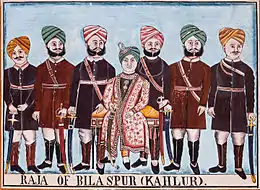Bilaspur State (princely state)
Bilaspur State or Kahlur was a princely state in the Punjab Province during the era of British India, ruled by Chandel dynasty.
Bilaspur State Kahlur State | |||||||
|---|---|---|---|---|---|---|---|
| 1815–1948 | |||||||
 Flag
 Coat of arms
| |||||||
 Princely States of the Shimla Hills, Bilaspur in the south straddling the Sutlej (1911) | |||||||
| Status | Princely state of the British Raj | ||||||
| Capital | Bilaspur, Sunhani[1] | ||||||
| Government | Monarchy | ||||||
| History | |||||||
• Established | 1815 | ||||||
• Disestablished | 1948 | ||||||
| Area | |||||||
| 1931 | 1,173 km2 (453 sq mi) | ||||||
| Population | |||||||
• 1931 | 100,994 | ||||||
| |||||||
| Today part of | Himachal Pradesh, India | ||||||

.jpg.webp)
The state was initially known as Kahlur and was later renamed Bilaspur.[2] It covered an area of 1,173 km2 (453 sq mi), and had a population of 100,994 according to the 1931 Census of India. The last ruler of Bilaspur State acceded to the Indian Union on 12 October 1948.
Bilaspur State remained Bilaspur Province in independent India until 1950 when the province was briefly renamed "Bilaspur State" before it was merged with Himachal Pradesh state as a district in 1954.[3]
History
According to local myths compiled during the reign of Raja Hira Chand the predecessor state was founded around 697 CE by Bir Chand. After Kahal Chand had built Kahlur Fort the state was named after it. Initially the capital of the state was at a place named Jhandbari — now in Hoshiarpur district — and then it was transferred to Kahlur Fort, but was later moved permanently to Bilaspur[2] by Dip Chand, the 32nd Raja of Kahlur (reigned 1663–1665). Since the 18th-century the rulers of Bilaspur State patronised artists of the Kangra painting style.[4]
Bilaspur State came under British protection in 1815[5] under Raja Mahan Chand and became one of the Simla Hill States. Raja Anand Chand was the last ruler of the princely state and Pandit Sant Ram was the last Home Minister. As Bilaspur acceded to India on 28 October 1948, Bilaspur retained an independent identity as a separate province and as a part-C State of India. The Raja was appointed commissioner of the State. In following years after Raja resigned his deputy Chhabra, who was appointed by govt of India, helped run the temporary govt of Bilaspur while the territory of the princely state was politically integrated into the Indian Union.
From 26 January 1950 Bilaspur was administered by the Government of India as a separate C-Class state named Bilaspur State which in 1954 was incorporated into the State of Himachal Pradesh as a province.[3]
The Family
Chandel Rajputs in Bilaspur belong to different branches of the ruling family.These families are numerous, and all enjoyed jagir pensions from state amounting in aggregate to Rs. 40,000 a year in 1933.The chief names are:
- Ajmerchandia
- Kaliyanchandia
- Tarachandia
- Sultanchandia
Rajas
- Bir Chand, founder; (r. 697–730) or fl. 880
- Udhran Chand
- Jaskarn Chand
- Madanbrahm Chand
- Ahl Chand
- Kahal Chand, 6th Raja
- Slar Chand
- Men Chand
- Sen Chand
- Sulkhan Chand
- Kahn Chand, 11th Raja. Conquered Hindur, which he created as a separate realm for his second son.
- Ajit Chand, 12th Raja (son of Khan Chand)
- Gokul Chand
- Udai Chand, (r. 1133–1143)
- Gen Chand
- Pruthvi Chand
- Sangar Chand, (r. 1197–1220)
- Megh Chand, (r. 1220–1251)
- Dev Chand
- Ahim Chand
- Abhisand Chand, (r. 1302–1317)
- Sampurn Chand (r. 1317–1355)
- Rattan Chand (r. 1355–1406)
- Narandar Chand
- Fath Chand
- Pahar Chand
- Ram Chand
- Uttam Chand
- Gyan Chand (r. 1518–1555)
- Bikram Chand (r. 1555–1593)
- Sultan Chand (r. 1593–1600)
- Kalyan Chand (r. 1600–1636)
- Tara Chand (r. 1636–1653)
- Dip Chand (r. 1653–1665)
- Bhim Chand (Kahlur) (r. 1665–1692)
- Ajmer Chand (r. 1692–1728)
- Devi Chand (r. 1738–1778)
- Mahan Chand (r. 1778–1824)
- Kharak Chand (r. 1824 – March 1839)
- Jagat Chand (r. March 1839 – 1850)
- Hira Chand (r. March 1850 – January 1883)
- Amar Chand (r. January 1883 – January 1889)
- Bijai Chand (r. 3 February 1889 – 18 February 1927)
- Anand Chand (r. 18 February 1927 – 12 October 1983)
- Gopal Chand (r. 26 October 1983 – present)
References
- http://www.censusindia.gov.in/2011census/dchb/0208_PART_B_DCHB_BILASPUR.pdf page 11
- States before 1947 A-J
- Social, cultural, and economic history of Himachal Pradesh By Manjit Singh Ahluwalia
- Hindu Hill Kingdoms Archived 30 March 2010 at the Wayback Machine V&A Museum.
- Chisholm, Hugh, ed. (1911). . Encyclopædia Britannica. 15 (11th ed.). Cambridge University Press. p. 634.
Further reading
- Hutchinson, J. & J. PH Vogel (1933). History of the Panjab Hill States, Vol. II. 1st edition: Govt. Printing, Pujab, Lahore, 1933. Reprint 2000. Department of Language and Culture, Himachal Pradesh. Chapter XIII Bilaspur State, pp. 494–518.
 Media related to Bilaspur State at Wikimedia Commons
Media related to Bilaspur State at Wikimedia Commons